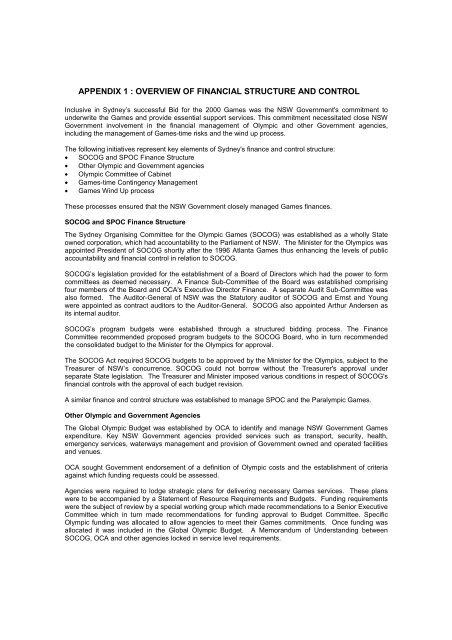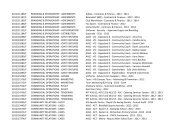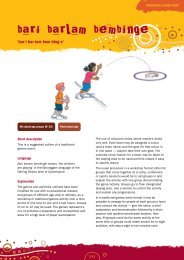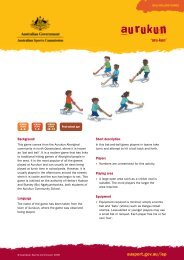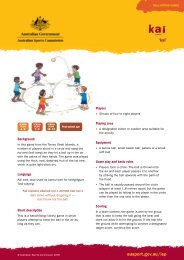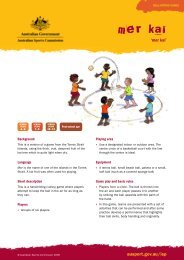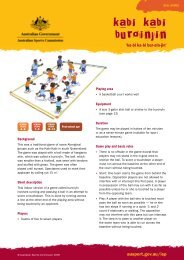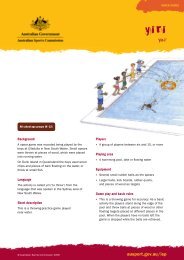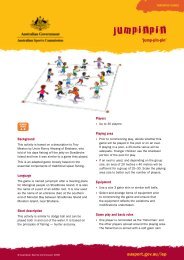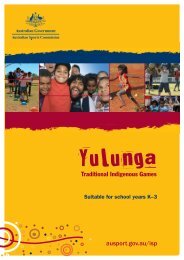the sydney 2000 olympic and paralympic games - Australian Sports ...
the sydney 2000 olympic and paralympic games - Australian Sports ...
the sydney 2000 olympic and paralympic games - Australian Sports ...
You also want an ePaper? Increase the reach of your titles
YUMPU automatically turns print PDFs into web optimized ePapers that Google loves.
APPENDIX 1 : OVERVIEW OF FINANCIAL STRUCTURE AND CONTROL<br />
Inclusive in Sydney’s successful Bid for <strong>the</strong> <strong>2000</strong> Games was <strong>the</strong> NSW Government's commitment to<br />
underwrite <strong>the</strong> Games <strong>and</strong> provide essential support services. This commitment necessitated close NSW<br />
Government involvement in <strong>the</strong> financial management of Olympic <strong>and</strong> o<strong>the</strong>r Government agencies,<br />
including <strong>the</strong> management of Games-time risks <strong>and</strong> <strong>the</strong> wind up process.<br />
The following initiatives represent key elements of Sydney's finance <strong>and</strong> control structure:<br />
• SOCOG <strong>and</strong> SPOC Finance Structure<br />
• O<strong>the</strong>r Olympic <strong>and</strong> Government agencies<br />
• Olympic Committee of Cabinet<br />
• Games-time Contingency Management<br />
• Games Wind Up process<br />
These processes ensured that <strong>the</strong> NSW Government closely managed Games finances.<br />
SOCOG <strong>and</strong> SPOC Finance Structure<br />
The Sydney Organising Committee for <strong>the</strong> Olympic Games (SOCOG) was established as a wholly State<br />
owned corporation, which had accountability to <strong>the</strong> Parliament of NSW. The Minister for <strong>the</strong> Olympics was<br />
appointed President of SOCOG shortly after <strong>the</strong> 1996 Atlanta Games thus enhancing <strong>the</strong> levels of public<br />
accountability <strong>and</strong> financial control in relation to SOCOG.<br />
SOCOG’s legislation provided for <strong>the</strong> establishment of a Board of Directors which had <strong>the</strong> power to form<br />
committees as deemed necessary. A Finance Sub-Committee of <strong>the</strong> Board was established comprising<br />
four members of <strong>the</strong> Board <strong>and</strong> OCA's Executive Director Finance. A separate Audit Sub-Committee was<br />
also formed. The Auditor-General of NSW was <strong>the</strong> Statutory auditor of SOCOG <strong>and</strong> Ernst <strong>and</strong> Young<br />
were appointed as contract auditors to <strong>the</strong> Auditor-General. SOCOG also appointed Arthur Andersen as<br />
its internal auditor.<br />
SOCOG’s program budgets were established through a structured bidding process. The Finance<br />
Committee recommended proposed program budgets to <strong>the</strong> SOCOG Board, who in turn recommended<br />
<strong>the</strong> consolidated budget to <strong>the</strong> Minister for <strong>the</strong> Olympics for approval.<br />
The SOCOG Act required SOCOG budgets to be approved by <strong>the</strong> Minister for <strong>the</strong> Olympics, subject to <strong>the</strong><br />
Treasurer of NSW’s concurrence. SOCOG could not borrow without <strong>the</strong> Treasurer's approval under<br />
separate State legislation. The Treasurer <strong>and</strong> Minister imposed various conditions in respect of SOCOG's<br />
financial controls with <strong>the</strong> approval of each budget revision.<br />
A similar finance <strong>and</strong> control structure was established to manage SPOC <strong>and</strong> <strong>the</strong> Paralympic Games.<br />
O<strong>the</strong>r Olympic <strong>and</strong> Government Agencies<br />
The Global Olympic Budget was established by OCA to identify <strong>and</strong> manage NSW Government Games<br />
expenditure. Key NSW Government agencies provided services such as transport, security, health,<br />
emergency services, waterways management <strong>and</strong> provision of Government owned <strong>and</strong> operated facilities<br />
<strong>and</strong> venues.<br />
OCA sought Government endorsement of a definition of Olympic costs <strong>and</strong> <strong>the</strong> establishment of criteria<br />
against which funding requests could be assessed.<br />
Agencies were required to lodge strategic plans for delivering necessary Games services. These plans<br />
were to be accompanied by a Statement of Resource Requirements <strong>and</strong> Budgets. Funding requirements<br />
were <strong>the</strong> subject of review by a special working group which made recommendations to a Senior Executive<br />
Committee which in turn made recommendations for funding approval to Budget Committee. Specific<br />
Olympic funding was allocated to allow agencies to meet <strong>the</strong>ir Games commitments. Once funding was<br />
allocated it was included in <strong>the</strong> Global Olympic Budget. A Memor<strong>and</strong>um of Underst<strong>and</strong>ing between<br />
SOCOG, OCA <strong>and</strong> o<strong>the</strong>r agencies locked in service level requirements.


